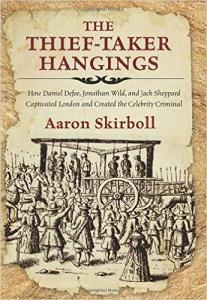 The Thief-Taker Hangings: How Daniel Defoe, Jonathan Wild, & Jack Sheppard Captivated London & Created the Celebrity Criminal
The Thief-Taker Hangings: How Daniel Defoe, Jonathan Wild, & Jack Sheppard Captivated London & Created the Celebrity Criminal
Lyons Press, 2014
Agent: Elise Capron
After the Glorious Revolution, a not so glorious age of lawlessness befell England. Crime ran rampant, and highwaymen, thieves, and prostitutes ruled the land. Execution by hanging often punished the smallest infractions, and rip-roaring stories of fearless criminals proliferated, giving birth to a new medium: the newspaper. In 1724, housebreaker Jack Sheppard--a "pocket Hercules," his small frame packed with muscle--finally met the hangman. Street singers sang ballads about the Cockney burglar because no prison could hold him. Each more astonishing than the last, his final jailbreak took him through six successive locked rooms, after which he shimmied down two blankets from the prison roof to the street below. Just before Sheppard swung, he gave an account of his life to a writer in the crowd. Daniel Defoe stood in the shadow of the day's literati--Swift, Pope, Gay--and had done hard time himself for sedition and bankruptcy. He saw how prison corrupted the poor. They came out thieves, but he came out a journalist. Six months later, the author of Robinson Crusoe and Moll Flanders covered another death at the hanging tree. Jonathan Wild looked every bit the brute--body covered in scars from dagger, sword, and gun, bald head patched with silver plates from a fractured skull--and he had all but invented the double-cross. He cultivated young thieves, profited from their work, then turned them in for his reward--and their execution. But one man refused to play his game. Sheppard didn't take orders from this self-proclaimed "thief-taker general," nor would he hawk his loot through Wild's fences. The two-faced bounty hunter took it personally and helped bring the young burglar's life to an end. But when Wild's charade came to light, he quickly became the most despised man in the land. When he was hanged for his own crimes, the mob wasn't rooting for Wild as it had for Sheppard. Instead, they hurled stones, rotten food, and even dead animals at him. Defoe once again got the scoop, and tabloid journalism as we know it had begun.
Reviews:
"A rollicking romp through London’s underbelly, Skirboll’s rich, multilayered account reveals the birth of society’s fascination with criminals." —Publishers Weekly
"Fans of both fictional and true crime stories will enjoy this fresh, well-written, and captivating page-turner full of fascinating characters engaged in a fast-moving plot." —Library Journal
"Part history, part true-crime, this account of London’s celebrity criminals is fresh and captivating." —The Lima News
“Skirboll shows the lives and trials of Londoners from all classes. . . . Though this is not a Defoe biography, his background and career producing pamphlets and newspapers are vital. . . . His exclusive interviews of felons in Newgate and other London prisons truly changed the face of journalism. . . . The daring cleverness of both Wild and Sheppard makes for fun historical reading.” —Kirkus Reviews
“Aaron Skirboll’s fascinating book will whisk you vividly back into history, capturing the zeal and aesthetic of the period. Equally satisfying, he delivers on the subtitle and smashes the mark. Intensely readable history like this is as hard to find as an incredibly textured story like this. Skirboll has penned an Edgar contender: He’s taken a slice of crime history and turned it into an instant classic, with a reporter’s nosy eye and a novelist’s flare for storytelling. The book is all at once compelling, engaging, skillfully crafted, but also energized by a layered subject that could have been ripped from today’s sensational headlines.” —M. William Phelps, New York Times–bestselling author of Murder, New England and The Devil’s Rooming House, and star of the Investigation Discovery series Dark Minds
“The Thief-Taker Hangings is history that reads like exciting fiction. This is a compelling story, wonderfully researched, that takes you deep into the seamy London of Restoration England through the intertwined stories of thief-taker Jonathan Wild and Jack Sheppard, the greatest escape artist of the day, and their lowlife molls, all of them known to Daniel Defoe, who covered the scene. Skirboll captures all of this with a human touch that gives his account an added compassion worthy of John Gay and Bertold Brecht.” —Peter Rand, author of Conspiracy of One
“Aaron Skirboll skillfully weaves together the lives and times of Daniel Defoe, who invented the English novel and literary true crime journalism, and two infamous criminals whose stories he told, Jonathan Wild and Jack Sheppard. From coffeehouse to prison, from high life to low, The Thief-Taker Hangings brings early eighteenth-century London vividly to life.” —Peter Kobel, author of The Strange Case of the Mad Professor